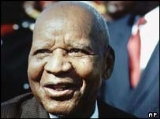
Hastings Banda
Overview
Hastings Kamuzu Banda (February 1898 – 25 November 1997) was the leader of Malawi
and its predecessor state, Nyasaland
, from 1961 to 1994. After receiving much of his education overseas, Banda returned to his home country (then British Nyasaland
) to speak against colonialism
and advocate for independence. In 1963, he was formally appointed as Nyasaland’s Prime Minister, and led the country to independence as Malawi a year later.
Malawi
The Republic of Malawi is a landlocked country in southeast Africa that was formerly known as Nyasaland. It is bordered by Zambia to the northwest, Tanzania to the northeast, and Mozambique on the east, south and west. The country is separated from Tanzania and Mozambique by Lake Malawi. Its size...
and its predecessor state, Nyasaland
Nyasaland
Nyasaland or the Nyasaland Protectorate, was a British protectorate located in Africa, which was established in 1907 when the former British Central Africa Protectorate changed its name. Since 1964, it has been known as Malawi....
, from 1961 to 1994. After receiving much of his education overseas, Banda returned to his home country (then British Nyasaland
Nyasaland
Nyasaland or the Nyasaland Protectorate, was a British protectorate located in Africa, which was established in 1907 when the former British Central Africa Protectorate changed its name. Since 1964, it has been known as Malawi....
) to speak against colonialism
Colonialism
Colonialism is the establishment, maintenance, acquisition and expansion of colonies in one territory by people from another territory. It is a process whereby the metropole claims sovereignty over the colony and the social structure, government, and economics of the colony are changed by...
and advocate for independence. In 1963, he was formally appointed as Nyasaland’s Prime Minister, and led the country to independence as Malawi a year later.
Quotations
Our talks were very pleasant, as usual. Remember I used to vote Labour when I was here.![]()
"Dr. Banda Denies Civil War", The Times, 12 December 1964, p. 6.

